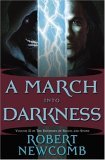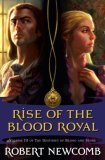
![]() The Fifth Sorceress by Robert Newcomb
The Fifth Sorceress by Robert Newcomb
This ambitious debut novel is set in a realm in which two kingdoms are divided by an impassable sea. Over 300 years prior to the story’s opening, a vicious war led to the exile of a coven of evil sorceresses whose lust for power would have led to the utter destruction of peaceful Eutracia had it not been for the intervention of the noble Directorate of Wizards. The book’s startlingly blunt sexual politics, in which the heroes are all male and the villains female, is only one of its dubious qualities. Robert Newcomb has delivered a first novel that, while competently written, ends up little more than an amalgam of fourth-hand ideas borrowed from better books.
In The Fifth Sorceress we have, once again, a reluctant protagonist prophesied as the “Chosen One” who must face Overwhelming Evil in a battle to the finish with the guidance of his own personal Gandalf, here renamed Wigg. Tristan is the heir to the throne of Eutracia. Approaching thirty, he will take the throne upon his birthday when his father abdicates to join the Directorate and become one of the wizards. And yet, Tristan has little love for the life of royalty. His rakish lifestyle, however, is indulged by his family, including his sister Shailiha.
Not long after Tristan accidentally stumbles upon a hidden cave in a nearby forest filled to the brim with magic — which gives him his first inkling of his destiny — his coronation takes place. But unbeknownst to them all, the Coven of Sorceresses, thought lost at sea over 300 years ago when Wigg banished them there, has taken over the land of Parthelon. And they are poised to wreak their long-planned revenge on Eutracia and the Directorate on the very night of the coronation itself. To this end they have bred a psychotic band of fanatical winged warriors called Minions. One of their objectives is the magical amulet the king wears. As in Robert Jordan‘s The Wheel of Time, magic has two separate sides; the amulet is meant for Tristan, who, as the Chosen One, can alone use it to unite these two magics. The Coven also intends to kidnap Tristan’s sweet, pregnant sister Shailiha, and use mind-control spells to turn her over to their side and make her their fifth sorceress. With both Shailiha and the amulet, the Coven hopes to perform a ritual that will allow them to (supervillain voice) rule the world!
You don’t have to be a flag-waving feminist to be gobsmacked by the novel’s sharp gender-based delineation between good and evil, which can — no kidding — be summed up as “men good, women bad.” Magic in Newcomb’s world is hereditary. If your blood is “endowed,” you have it, and if not, too bad. (Shades of Harry Potter.) But women are the ones tainted by its power, choosing to practice the Vagaries, magic’s dark side, while the male wizards utilize the Vigors. The reader feels justified in attributing actual misogyny to the book upon viewing the “good” female characters, who are, without exception, wives and sisters, mothers and daughters, crocheting tapestries and taking tea. Ambition in women leads to corruption; in men, to noble and altruistic goals. Considering how many women make up the fantasy readership overall, many of whom could well be drawn to the book by the word “sorceress” in the title, Newcomb has made a major miscalculation in anticipating his target audience.
Anyway, the attack occurs, in what is perhaps the novel’s only dramatically effective scene (and this mostly due to its Goodkindian graphic violence). Wigg and Tristan barely escape a horrible death, and Shailiha is spirited away across the ocean. Wigg and Tristan must now race against time to find a way to stop the Coven from carrying out its nefarious plans. And Tristan, obsessed with revenge, must face the terrible prospect that he may have to slay his own beloved sister.
It would be the understatement of the 21st century to say that Newcomb paints his characters in broad strokes. Hell, the guy practically uses a spray gun. The cast of this novel is so quintessentially archetypal that, in the end, no one is particularly believable or even interesting. Tristan is just another variation on the Hero with a Thousand Faces. His reluctance to take the reins of power and his boyish insouciance towards responsibility are as cut-and-dried as his sister’s doe-eyed sweetness, which will probably send most readers into insulin shock. Ultimately the only things the Eutracian royal family lack are haloes. Shailiha is a particular problem. She’s never an actual person, simply a walking symbol, going from Good™ to Evil™ in such a perfunctory manner that you never feel anything about it.
The sorceresses are almost comically evil. You wonder how it is they all haven’t killed each other off in a PMS-induced magical cataclysm by now. For instance, we first meet Succiu, the number two bitch in the Coven, as she is torturing a sex slave who irked her by not being able to get it up. The scene, I suspect, is supposed to be shocking and taboo-defying, but of course, Jacqueline Carey has already given fantasy the final word on this subject, and Newcomb additionally has the poor judgment to crack readers up by providing Succiu with a dwarf slave named Geldon (“gelded” — get it?) whom she leads around by a jeweled collar! As you might have guessed, Newcomb is not about subtlety.
The winged Minions provide the novel with the only interesting character it has, their leader Kluge, but that’s only because he’s such a violent one-dimensional killing machine that when he turns up you realize with a smile of relief that this will be a chapter in which something actually happens. Mostly, The Fifth Sorceress is one of those exposition-heavy fantasies in which our hero finds stuff out by having someone, usually the Mentor/Gandalf Clone, tell him.
And it’s in much of this exposition that Newcomb’s logic fail is exposed. At one point, Wigg and Tristan track down a reclusive mage in an enchanted forest. They find out that the Coven’s ritual is due to take place in just over a week — and even if they knew the Sorceresses’ secret to cross the sea, it would take over 15 days. What to do? No problem. This mage just happens to be the first guy in history to figure out how to create portals into Parthelon, and he’s been getting inside information from none other than poor abused Geldon. Wigg and Tristan can just pop over, meet up with Geldon, and slip into the Coven’s stronghold. So here we get author’s convenience and illogic combined. Why didn’t Geldon use the portal to escape into Eutracia and head for the hills the minute it first appeared? Or barring that, why, given the portals’ existence, must Geldon keep needing to use specially magicked pigeons to fly over sea to send the mage notes?
The fantasy genre, it appears, will continue on its blissful course of offering up overlong debut novels by mediocre writer after mediocre writer fancying themselves the heir to the throne. With crap like The Fifth Sorceress cluttering rackspace, is it any wonder readers get so impatient with George R.R. Martin?
This review by Thomas M. Wagner is reprinted from his website SFReviews.net by special arrangement.
The Chronicles of Blood and Stone — (2002-2007) Publisher: Not since Terry Goodkind unsheathed the Sword of Truth has there been such an epic tale of heroism and magic that so captures the imagination as this monumental new work by a master storyteller. In The Fifth Sorceress, Robert Newcomb conjures a time and place wrought with exquisite detail, characters vividly drawn and deeply felt, and a history rich in glory and horror, splendor and secrets… “We gave them a chance once, long ago… We offered to share power equally, and in peace. But they refused and chose war. With them it was all or nothing. Wizard against Sorceress. Male against female. Light against dark.” It is more than three centuries since the ravages of a devastating war nearly tore apart the kingdom of Eutracia. In its wake, those who masterminded the bloodshed — a quartet of powerful, conquest-hungry Sorceresses — were sentenced to exile, with return all but impossible and death all but inevitable. Now a land of peace and plenty, protected and guided by a council of immortal wizards, Eutracia is about to crown a new king. And as the coronation approaches, the spirit of celebration fills every heart. Except one. Prince Tristan is a reluctant monarch-to-be. Though born with the “endowed” blood that will give him the power to master magic, and destined by tradition to succeed his father as ruler, he is a rebel soul. And when he discovers the ancient, hidden caves where strange red waters flow — possessed of their own mysterious magic — it only makes him yearn all the more to escape his future of duty… and succumb to the stirrings of enchantment within him. But more than tradition compels Tristan to ascend the throne. The very existence of Eutracia depends upon it. For after these long centuries of peace, dreadful omens have begun to appear, heralding something too unspeakable to ponder. And if indeed the old evil has returned, hungry to wreak vengeance, Tristan’s role in an ages-old prophecy must be fulfilled — or the cost to his kingdom and his people will be beyond imagination. It will be a battle like none ever known, against an enemy whose thirst for blood and domination is depthless and unyielding. And for Tristan, it will be the ultimate challenge: facing an adversary whose greatest weapon is the person he loves most — transformed into the instrument of his annihilation… and the catalyst that will doom Eutracia forever to darkness.
The Chronicles of Blood and Stone
The Destinies of Blood and Stone








I remember when this one came out, and yeah, the title really was intriguing…and then I learned more about the premise, and yikes! o.O Great review.
The book is truly awful on so many levels, not the least of which is its misogyny.
Well, I had thought the review was a little abrupt. Now I can read the whole thing, hurray! I nearly fell off my chair laughing. Thank you for both entertaining me and saving me from a hellish reading experience!
I’m sure that Thomas’s review is much more entertaining than the book is!